


Have you ever noticed that your freshly cleaned clothes come out of the washing machine with an unpleasant smell? It can be frustrating and confusing, especially after you’ve gone through the trouble of cleaning your washing machine. So, why does your washing machine smell worse after cleaning? There are several possible reasons for this annoying issue.
One possible reason is that the cleaning solution you used to clean your washing machine may not have been effective in removing all the build-up and bacteria. Over time, dirt, grime, and detergent residue can accumulate in different parts of your machine, creating the perfect breeding ground for bacteria and mold. If these contaminants are not thoroughly eliminated during the cleaning process, they can cause a foul smell to develop.
Another common cause of a smelly washing machine is a clogged or gunked-up drainage system. If the drain pipe or filter is obstructed with lint, hair, or other debris, it can lead to water and moisture retention, which in turn creates a damp environment that promotes the growth of bacteria. Cleaning the drainage system regularly is crucial to prevent a foul odor from permeating your freshly washed clothes.
Furthermore, the rubber door seal, also known as the gasket, of your washing machine can be a major source of unpleasant smells. The rubber material can easily accumulate moisture, dirt, and grime, which can eventually form mold and mildew. If the gasket is not properly cleaned and dried after each use, it can emit a musty smell that transfers onto your clothes during the wash cycle.
So, what can you do to solve these smelly washing machine issues?
To ensure that your washing machine doesn’t smell worse after cleaning, it’s essential to use a cleaning solution specifically formulated for washing machines. These solutions are designed to penetrate and eliminate stubborn build-up, mold, and bacteria. Additionally, regularly cleaning the drainage system, including the filter, will prevent water retention and the associated unpleasant odors. Lastly, pay special attention to the rubber door seal by regularly wiping it down with a mixture of vinegar and water or using a specialized cleaning solution recommended by the manufacturer.
By following these solutions, you can keep your washing machine smelling fresh and your clothes clean and odor-free. Don’t let a smelly washer spoil your laundry day – take action to eliminate those unpleasant odors!
Why Cleaning Your Washing Machine Can Make it Smell Worse
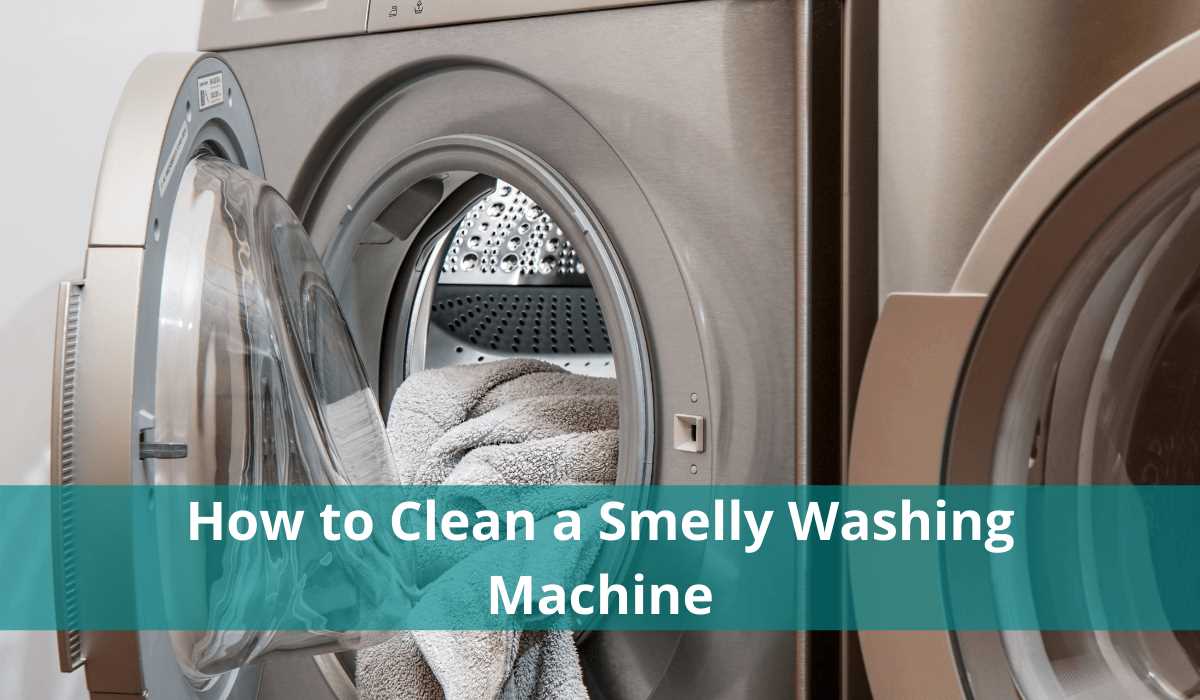
It’s a common misconception that cleaning your washing machine will always leave it smelling fresh and clean. However, sometimes the cleaning process itself can actually make your washing machine smell worse. There are a few reasons why this can happen:
1. Residue Buildup
Over time, residue from detergent, fabric softener, and dirt can accumulate in various parts of your washing machine, such as the drum, hoses, and filters. Cleaning your washing machine can dislodge this buildup, releasing the trapped residue and causing a temporary increase in odor. This can happen even if you regularly run self-cleaning cycles.
2. Mold and Mildew Growth
If you’ve neglected cleaning your washing machine for an extended period of time, there may be mold and mildew growing inside. When you clean your machine, the mold and mildew can be disturbed, releasing odorous spores into the air and exacerbating the smell. This is especially true for front-loading washing machines, which are more prone to mold and mildew growth.
3. Blocked Drainage System
If your washing machine has a blocked drainage system, cleaning it can cause the stagnant water and debris to be loosened and released. This can result in a foul smell as the stagnant water and debris get mixed with the cleaning solution. It’s important to regularly check and clean the drainage system to avoid this issue.
4. Using the Wrong Cleaning Products
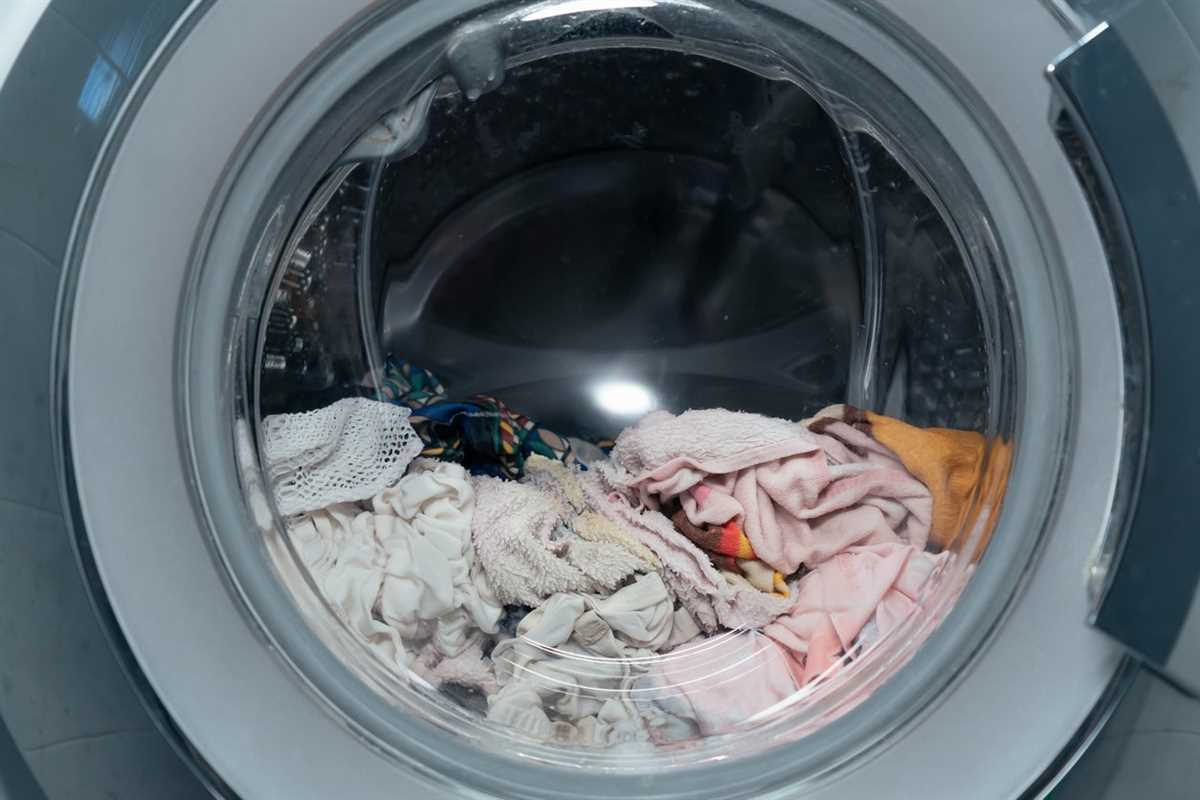
Using the wrong cleaning products or too much cleaning solution can also contribute to a worse smell after cleaning. Harsh chemicals can leave behind a strong lingering odor that is unpleasant. It’s best to use mild, specifically formulated washing machine cleaners and follow the instructions carefully.
To minimize the potential for a worse smell after cleaning your washing machine, it’s important to regularly maintain and clean your machine. This includes running self-cleaning cycles, wiping down the interior, and keeping the door or lid open when not in use to allow for air circulation. Additionally, using the appropriate amount of detergent and avoiding excessive use of fabric softener can help prevent residue buildup.
| 1. Run self-cleaning cycles regularly | 2. Wipe down the interior of the machine | 3. Keep the door or lid open when not in use |
|---|---|---|
| 4. Use the appropriate amount of detergent | 5. Avoid excessive use of fabric softener | 6. Use mild, specifically formulated cleaning products |
The Issue with Odor and Washing Machines
One common problem that many homeowners face is a foul odor coming from their washing machines. This issue can be quite frustrating, especially considering that the smell often becomes worse after cleaning the machine. So, why does this happen?
1. Residue Build-Up: Over time, washing machines can accumulate residue from detergent, fabric softener, dirt, and other debris. This residue can get trapped in various parts of the machine, including the drum, hoses, and filter.
2. Mold and Mildew: The moist environment inside the washing machine is an ideal breeding ground for mold and mildew. These fungi can thrive in the dampness and darkness, causing unpleasant odors.
3. Bacterial Growth: Bacteria can also contribute to the foul smell in washing machines. Harmful bacteria can find their way into the machine through dirty clothes, and if not regularly cleaned, they can multiply and cause unpleasant odors.
4. Insufficient Cleaning: Cleaning the washing machine itself is not enough to eliminate the odor. Many people neglect to clean other components, such as the detergent drawer and seal, where residue and mildew tend to accumulate.
5. Poor Ventilation: Inadequate ventilation can also contribute to the odor problem. If the laundry area does not have proper ventilation, moisture can become trapped, leading to mold growth and bad smells.
To resolve these issues and prevent a smelly washing machine, regular maintenance and cleaning are necessary. Here are a few solutions:
- Cleaning Routine: Develop a cleaning routine for your washing machine. This should include cleaning the drum, detergent drawer, seal, and filter regularly.
- Use Hot Water: Run a hot water cycle with no clothes or detergent to help remove any residue and kill bacteria.
- Vinegar or Baking Soda: Use vinegar or baking soda during a hot water cycle to help remove odors and residue.
- Leave the Door Open: After each wash, leave the washing machine door open to allow it to dry fully. This helps prevent mold and mildew growth.
- Improve Ventilation: If your laundry area lacks proper ventilation, consider installing a fan or opening windows to improve air circulation.
By following these steps and maintaining a regular cleaning routine, you can keep your washing machine smelling fresh and prevent the odor from returning.
Possible Causes of the Unpleasant Smell
There are several potential causes for the unpleasant smell in your washing machine. Understanding these causes can help you identify and address the issue:
- Bacteria and Mold Buildup: The warm and damp environment inside the washing machine creates an ideal breeding ground for bacteria and mold. Over time, these microorganisms can multiply and cause a foul odor.
- Residue and Detergent Buildup: Residual detergent, fabric softener, and lint can accumulate in hidden areas of the washing machine, such as the drum, hoses, and dispensers. This build-up can lead to unpleasant smells.
- Clogged Drainage System: If the drainage system of your washing machine is clogged, it can cause water to accumulate, leading to stagnant water and foul odors.
- Washing Machine Overuse: Overloading your washing machine or using it excessively without proper maintenance can contribute to the development of unpleasant smells. The machine may not have enough time to dry out between cycles, allowing bacteria and mold to grow.
How to Prevent and Eliminate Odor in Your Washing Machine
1. Clean the drum regularly
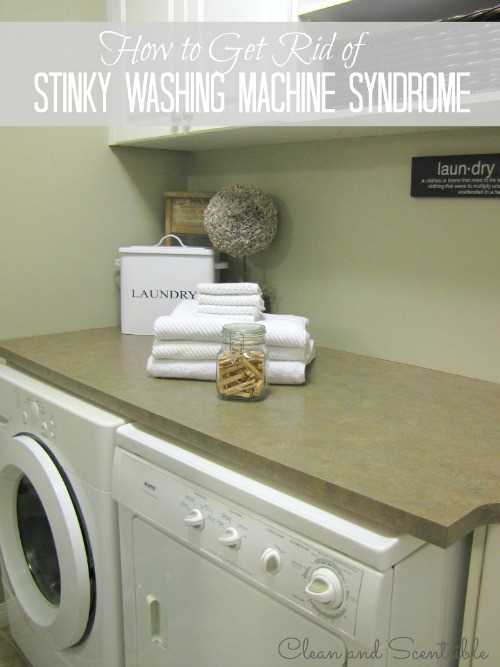
To prevent your washing machine from developing unpleasant odors, it’s essential to clean the drum regularly. Remove any clothing or items from the machine and wipe down the interior with a damp cloth or sponge. This will help to remove any residue or build-up that can contribute to unpleasant smells.
2. Use hot water and detergent
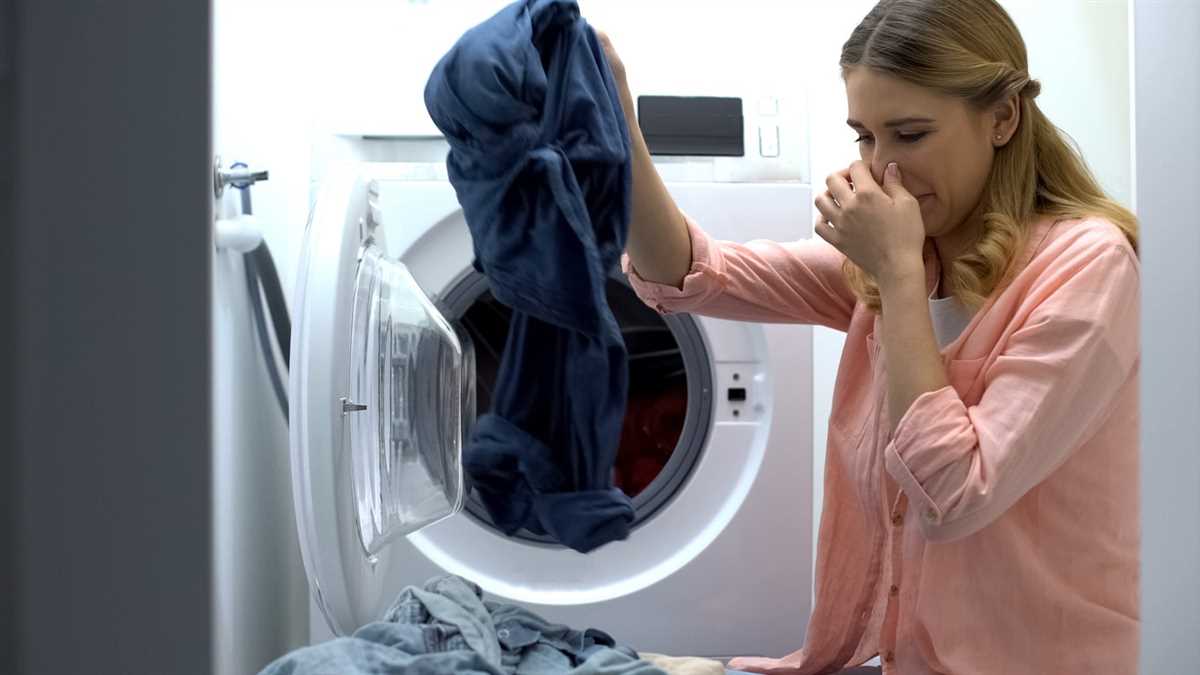
When running a cleaning cycle for your washing machine, choose a hot water setting and add a detergent or cleaning solution specifically designed for washing machine cleaning. The hot water and detergent will help to break down any residue or mold that may be causing the odor.
3. Remove and clean the detergent dispenser
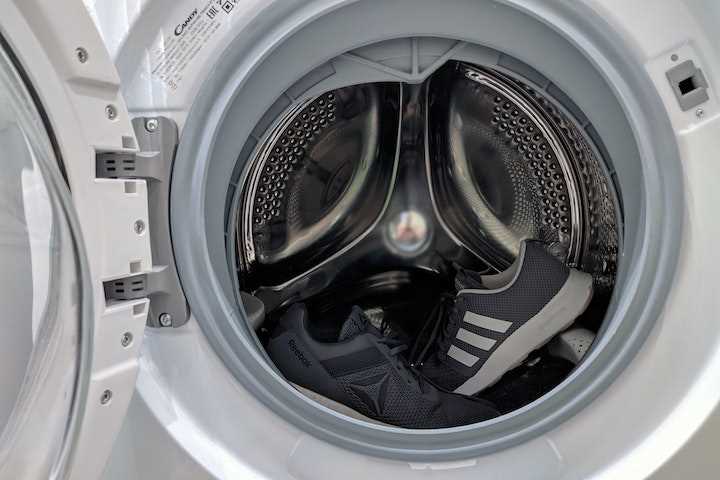
The detergent dispenser can often become a breeding ground for bacteria and mold, leading to unpleasant odors. Remove the dispenser from your washing machine and clean it thoroughly with hot, soapy water. Be sure to remove any residue or build-up that may be contributing to the smell.
4. Check and clean the filter
A clogged or dirty filter can trap debris and contribute to odors in your washing machine. Check your machine’s manual for instructions on how to locate and clean the filter. Remove any debris or build-up, rinse it under hot water, and replace it back into the machine.
5. Leave the door open after each use
One common cause of washing machine odors is leaving the door closed between uses. Moisture can become trapped inside the machine, creating a breeding ground for mold and bacteria. After each use, leave the door open to allow the drum to dry out fully.
6. Use vinegar or baking soda
Both vinegar and baking soda are natural cleaners and deodorizers. Once a month, run an empty cycle with a cup of white vinegar or a cup of baking soda to help remove any lingering odors and disinfect the machine. Simply add the vinegar or baking soda to the drum and run a hot water cycle.
7. Clean the gasket and door seal
The gasket and door seal can also harbor moisture and debris, leading to unpleasant smells. Regularly check and clean the gasket and door seal, removing any visible residue or buildup. Use a mild detergent and a soft cloth or sponge to wipe them clean.
8. Avoid overloading the machine
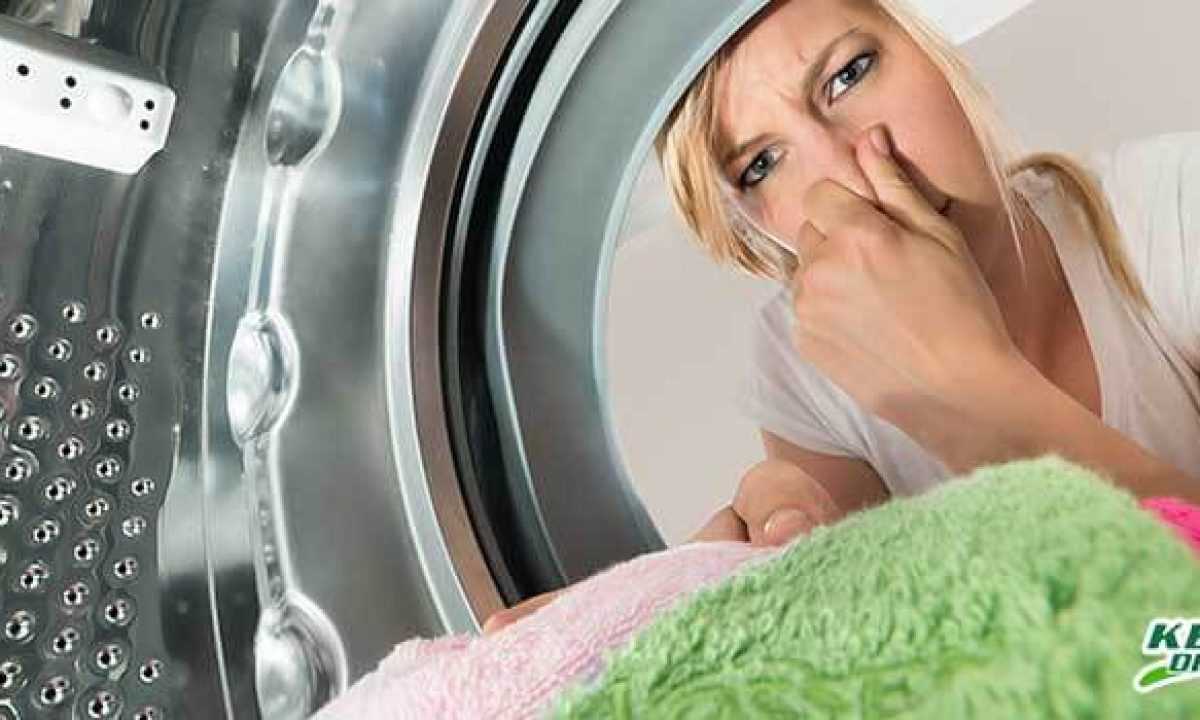
Overloading the washing machine can prevent water and detergent from reaching all areas of the drum, leading to the accumulation of dirt, grime, and odors. Follow the manufacturer’s guidelines for load capacity and avoid cramming too many items into the machine.
9. Use chlorine bleach sparingly
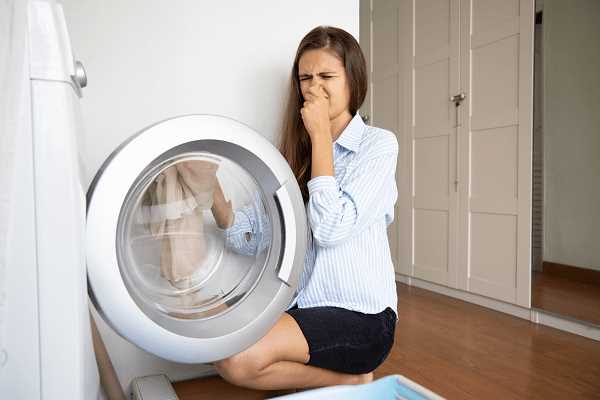
While chlorine bleach can help to kill bacteria and remove odors, it should be used sparingly in the washing machine. Overuse of bleach can damage the machine’s components and cause excessive wear. Follow the manufacturer’s guidelines for using bleach and consider alternative cleaning methods when possible.
10. Regularly inspect and clean the drain pump
The drain pump is responsible for removing water and debris from the machine. Over time, the pump can become clogged with lint, hair, and other debris, leading to unpleasant odors. Inspect the drain pump regularly and remove any obstructions to ensure proper functioning and eliminate odors.
By following these tips and incorporating regular cleaning into your washing machine maintenance routine, you can prevent and eliminate odor in your washing machine, ensuring it continues to provide fresh and clean laundry.
Tips and Tricks for Maintaining a Fresh-Smelling Washing Machine
Keeping your washing machine smelling fresh is essential for ensuring clean and pleasant-smelling clothes. Here are some tips and tricks to help you maintain a fresh-smelling washing machine:
Clean the Drum Regularly
One of the most important steps in maintaining a fresh-smelling washing machine is to clean the drum regularly. Remove any dirt, lint, or residue that may have accumulated. You can use a damp cloth, mild detergent, and warm water to clean the drum thoroughly. Wipe all the nooks and crannies, including the rubber seal, which is a common hiding spot for mold and mildew.
Use a Washing Machine Cleaner
In addition to regular cleaning, it is a good idea to use a washing machine cleaner from time to time. These cleaners are designed to remove built-up dirt, grime, and odors that may be lurking in your machine. Follow the instructions on the product packaging for the best results.
Avoid Overloading the Machine

Overloading your washing machine can lead to poor cleaning performance and unpleasant odors. It is important to follow the manufacturer’s recommendations for load sizes. Overloading the machine can also put extra strain on the drum and other components, potentially leading to mechanical issues.
Leave the Door Open Between Loads
After each wash, it is a good idea to leave the door of the washing machine open for a while. This allows the drum to dry out and prevents moisture from building up, which can contribute to mold and mildew growth. If you can’t leave the door open, consider using a towel to wipe down the drum and door seal after each use.
Remove Wet Clothes Promptly
Leaving wet clothes sitting in the washing machine for an extended period can lead to a musty smell. Be sure to remove your clothes promptly after the wash cycle is complete. If you can’t remove them right away, consider setting a timer to remind yourself.
Consider Using Vinegar
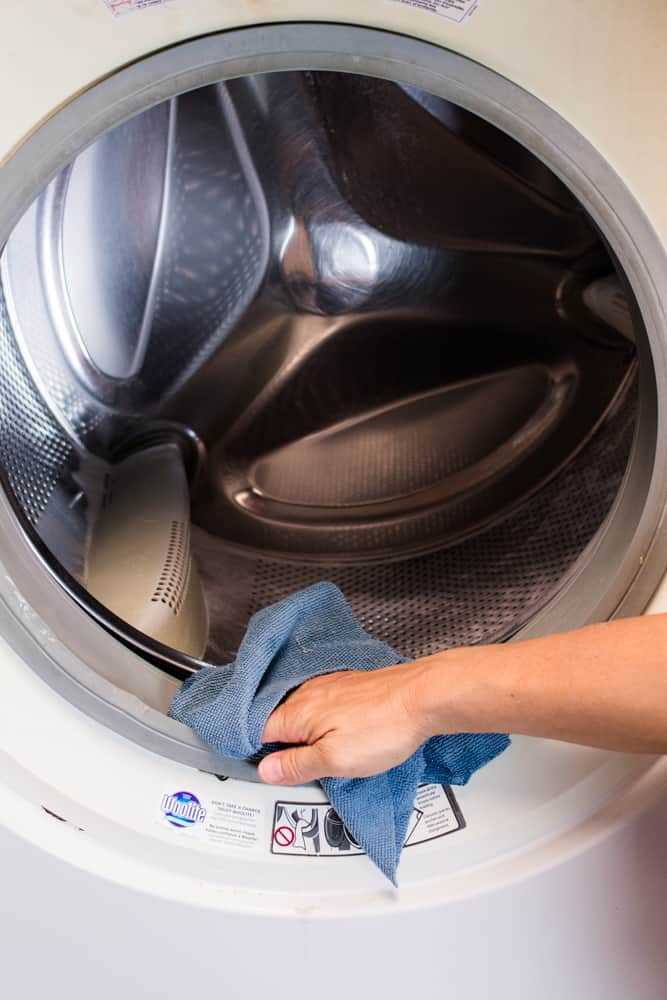
Vinegar is a natural cleaning agent that can help eliminate odors from your washing machine. You can add a cup of white vinegar to a regular wash cycle without any clothes. The vinegar will help remove any lingering odors and leave your machine smelling fresh.
Check the Drainage System
If your washing machine smells bad even after cleaning, it may be a sign of a drainage problem. Check the drainage hose and filter for any clogs or blockages. Clean them out if necessary, and ensure that the water is flowing freely.
Keep the Washing Machine Dry
Moisture is the enemy when it comes to preventing unpleasant smells in your washing machine. Make sure to wipe down the drum and other surfaces after each use to remove any moisture. You can also use a dry towel to absorb any excess water.
By following these tips and tricks, you can maintain a fresh-smelling washing machine and enjoy clean and pleasant-smelling clothes every time.
FAQ
Why does my washing machine smell worse after cleaning?
There are a few reasons why your washing machine might smell worse after cleaning. One possible reason is that the cleaning solution you used didn’t effectively remove all of the dirt and grime from the machine. Another reason could be that the cleaning process stirred up mold or mildew that was growing in hard-to-reach areas of the machine. Finally, it’s also possible that the cleaning solution itself has a strong odor that is lingering in the machine.
What can I do if my washing machine smells worse after cleaning?
If your washing machine smells worse after cleaning, there are a few steps you can take to try to eliminate the odor. First, try running an empty cycle with hot water and a cup of white vinegar. This will help remove any lingering smells. You can also try scrubbing the drum and other parts of the machine with a mixture of baking soda and water. If the smell persists, it might be worth calling a professional to take a look at your machine.
How often should I clean my washing machine?
It is recommended to clean your washing machine at least once every month. Regular cleaning helps prevent the buildup of dirt, grime, and odor-causing bacteria. However, if you notice a strong smell coming from your machine, it may be necessary to clean it more frequently until the odor is eliminated.
Can I use bleach to clean my washing machine?
Yes, you can use bleach to clean your washing machine. However, it’s important to use it in moderation and follow the manufacturer’s instructions. Bleach can be harsh and may damage certain parts of the machine if used improperly. It’s also a good idea to run an empty cycle with hot water after using bleach to rinse away any residue.
Are there any preventive measures I can take to avoid my washing machine smelling worse after cleaning?
Yes, there are several preventive measures you can take to avoid your washing machine smelling worse after cleaning. First, make sure to remove wet clothes promptly after each wash to prevent the growth of mold and mildew. Secondly, leave the door or lid of the machine open after each use to allow air to circulate and prevent moisture buildup. Finally, avoid overloading the machine, as this can lead to poor washing results and a buildup of dirt and grime.












